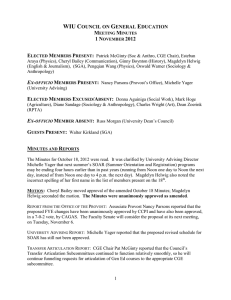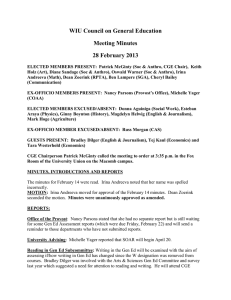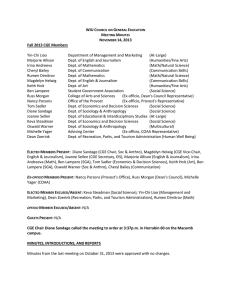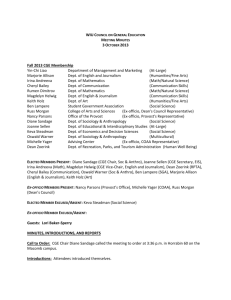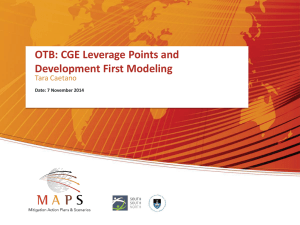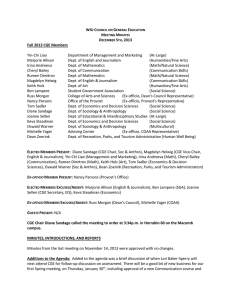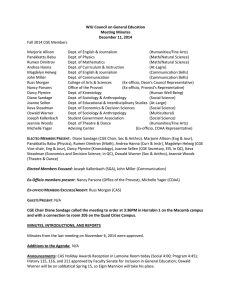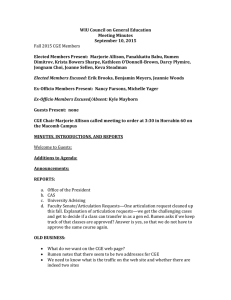WIU C G E
advertisement
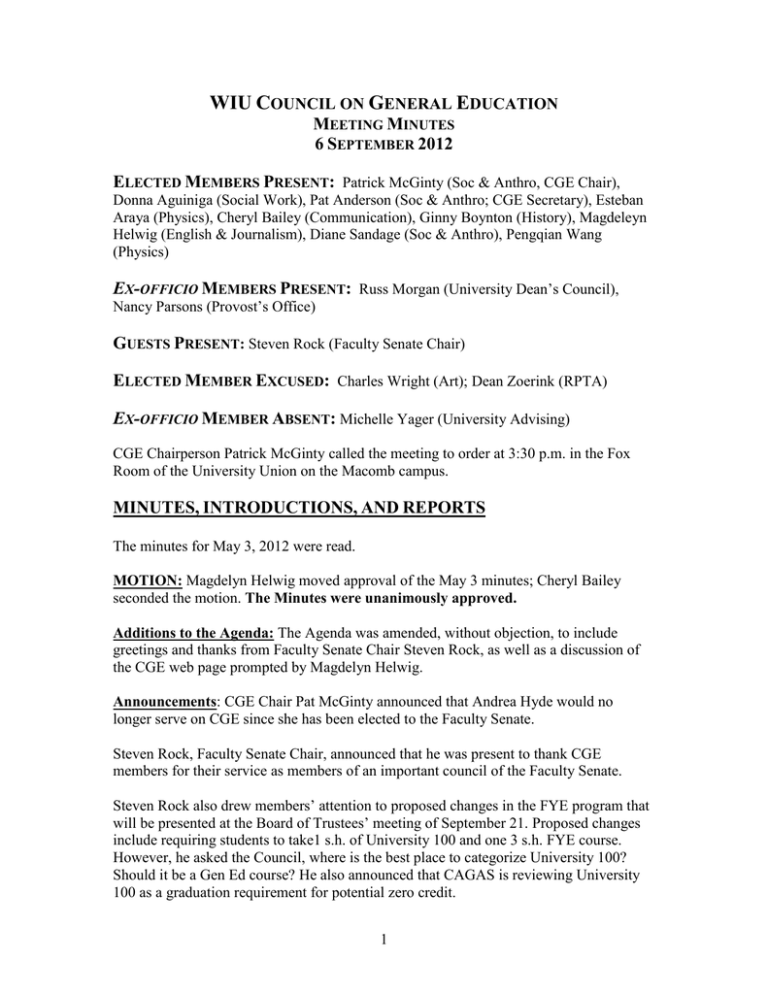
WIU COUNCIL ON GENERAL EDUCATION MEETING MINUTES 6 SEPTEMBER 2012 ELECTED MEMBERS PRESENT: Patrick McGinty (Soc & Anthro, CGE Chair), Donna Aguiniga (Social Work), Pat Anderson (Soc & Anthro; CGE Secretary), Esteban Araya (Physics), Cheryl Bailey (Communication), Ginny Boynton (History), Magdeleyn Helwig (English & Journalism), Diane Sandage (Soc & Anthro), Pengqian Wang (Physics) EX-OFFICIO MEMBERS PRESENT: Russ Morgan (University Dean’s Council), Nancy Parsons (Provost’s Office) GUESTS PRESENT: Steven Rock (Faculty Senate Chair) ELECTED MEMBER EXCUSED: Charles Wright (Art); Dean Zoerink (RPTA) EX-OFFICIO MEMBER ABSENT: Michelle Yager (University Advising) CGE Chairperson Patrick McGinty called the meeting to order at 3:30 p.m. in the Fox Room of the University Union on the Macomb campus. MINUTES, INTRODUCTIONS, AND REPORTS The minutes for May 3, 2012 were read. MOTION: Magdelyn Helwig moved approval of the May 3 minutes; Cheryl Bailey seconded the motion. The Minutes were unanimously approved. Additions to the Agenda: The Agenda was amended, without objection, to include greetings and thanks from Faculty Senate Chair Steven Rock, as well as a discussion of the CGE web page prompted by Magdelyn Helwig. Announcements: CGE Chair Pat McGinty announced that Andrea Hyde would no longer serve on CGE since she has been elected to the Faculty Senate. Steven Rock, Faculty Senate Chair, announced that he was present to thank CGE members for their service as members of an important council of the Faculty Senate. Steven Rock also drew members’ attention to proposed changes in the FYE program that will be presented at the Board of Trustees’ meeting of September 21. Proposed changes include requiring students to take1 s.h. of University 100 and one 3 s.h. FYE course. However, he asked the Council, where is the best place to categorize University 100? Should it be a Gen Ed course? He also announced that CAGAS is reviewing University 100 as a graduation requirement for potential zero credit. 1 Introduction of Council Members: CGE Chair, Pat McGinty, asked council members to introduce themselves, and to state the area that they represent on the committee. REPORTS: Office of the Provost: Nancy Parsons announced that she is still organizing the results of the Gen Ed assessment report from various departments. College of Arts & Sciences: Dr. Russ Morgan announced that he had nothing new to report. University Advising: Due to Michelle Yager’s absence no report was forthcoming. CGE Chair Pat McGinty handed out copies of the 2012-2013 General Education Handbook to members, as well as a six-page handout detailing the philosophy and goals of Gen Ed, categories of Gen Ed, and Gen Ed writing requirements. Reading in Gen Ed Subcommittee: Pat McGinty announced that the committee is now reduced to Ginny Boynton, Magdelyn Helwig and himself, with the rotation off the Council of Jess White, and Cindy Struthers. OLD BUSINESS Chair McGinty noted for new members the four standing items of Old Business that CGE will need to work on this year. First, is an ongoing concern with the assessment feedback loop and ongoing revisions to the feedback form. Second, is the need for revision of the Multicultural Gen Ed Request for Inclusion form, as it is currently not as clear as it could be regarding what makes a course a multicultural one. Third, CGE needs to answer the question of whether or not the general education assessment is aligned to the goals of General Education of the content of a general education course. Fourth, is the need for CGE to develop and carry-out a plan that follows up on the EASC essential skills survey. NEW BUSINESS Nancy Parsons announced that there is a report on FYE on the FYE web page with recommendations about FYE courses and how we can better help students adjust to WIU. She noted that the common reading has been eliminated and that a number of inconsistencies have been noted in the structuring of FYE classes. For example, transitional content is being provided inconsistently. Questions include whether or not the FYE requirement should include a lab. However this would add 2 s.h. to the FYE requirement. In addition Nancy Parsons mentioned that a FYE Leadership Team had been constituted, including Angela Lynn, Registrar, as member. 2 In a continued discussion of whether University 100 should be a zero credit hour course, Diane Sandage related that in her experience students don’t attend when they are not working for credit. Ginny Boynton observed that students refer derisively to such a course as a “Mickey Mouse” course. According to Nancy Parsons, University 100 is currently taught by advisors, and is a requirement for athletes. She also mentioned that University 100 for FYE students would share a common syllabus and textbook, and common housing. Another point of discussion concerns the length of the course—should it be 8 or 16 weeks? It was generally concluded that 16 weeks would make more sense, as it would flow better with the semester. The course will be offered in both the spring and fall terms, but there would be fewer sections in the spring. Further discussion followed on where University 100 fits in the curriculum. Council members reached a consensus that Human Well Being seems to make the most sense. Members also agreed that the course should be offered for credit, so that students would take the course seriously. Regarding additional changes to FYE, Nancy Parsons stated that the extracurricular activities had been eliminated. Further inconsistencies reported from assessment of the FYE program include the application of peer mentors—some attended the FYE class that they were assigned to mentor all the time, while others did not. Some peer mentors organized study sessions for students, while others did not. Diane Sandage observed that it is helpful for FYE students to have mature student role models in the classroom. However Nancy Parsons stated that the constituency of the FYE classes would continue to be freshmen only. CGE chair Pat McGinty stated that if University 100 is to be included in Human Well Being, then the definition needs to be expanded. Nancy Parsons answered that discussions are needed to redefine the category. Pat McGinty cautioned that care must be taken so that different departments are not pitted against each other. Pat McGinty then posed the question to Nancy Parsons, what would you like from CGE? Nancy Parsons asked, “Does it make sense to make University 100 a Gen Ed classification?” In response, a discussion followed. Donna Aguiniga stated that it was “problematic.” Ginny Boynton observed that University 100 is not substantive enough to fit into Gen Ed. Ginny Boynton stated that we need to review a syllabus to determine if it is a Gen Ed course. Magdelyn Helwig asked if University 100 would be a graded course? Nancy Parson answered, yes, A, B, C, D, and F. Nancy Parsons said that there is already a greater attempt to involve FYE students in campus life through the use of a scavenger hunt held at the FYE kickoff to get incoming students familiar with campus. Teams ended up on Hanson Field where they received their class T-shirts and had their class photograph taken. The team (Tanner Hall) winning 3 the scavenger hunt had the honor of sitting with the President at the first football game, and eating pizza with him, an honor that they appreciated. Nancy Parsons mentioned that CAGAS has reviewed the question of whether or not University 100 should be awarded credit and they rejected the assignment of zero credit to the course. She also said that the textbook, which has been selected for University 100, is a 3-ring binder and costs the nominal sum of $29.00. One question for the future is, “Who will teach University 100?” Nancy Parsons stated that we want teachers who want our students to succeed. The possibility of second year graduate student teaching opportunities was raised. For university faculty, the teaching of University 100 would accord an overload and $1000 additional pay. Interested parties should apply. Ginny Boynton asked if graduate students in other departments would be eligible to apply? Nancy Parsons answered, “Perhaps; it is an attitude thing.” Nancy Parsons said that she would next be talking to CCPI about University 100, and that when she attends the next CGE meeting she will bring the course syllabus. She emphasized that arrangements must be completed soon as scheduling must be done by October. CGE Chair Pat McGinty stated that the graduation requirement was not the concern of CGE, but rather how it fits into Gen Ed. Nancy closed by stating that she is open to ideas on how to make it successful. CGE Chair Pat McGinty then turned to discussion of the CGE articulation subcommittees, and mentioned that the past arrangement had worked well. He noted that during 2010-2011 the Chair of CGE (Cindy Struthers) handled all the articulations personally and that last year CGE members had handled their respective articulation area. Regarding articulation, the major point is whether or not the course meets the Gen Ed goals. Diane Sandage asked if there was an SGA rep, but Chair Pat McGinty answered that none had been assigned yet. Magdelyn Helwig mentioned that the CGE web page had not been updated since 2010. Pat McGinty answered that the “ghost” of the old one comes up first when searching for CGE and that you must go through the Faculty Senate page to get to the current web page for CGE. He mentioned that updates/corrections are handled by Annette Hamm who maintains the website for Faculty Senate, but that we can add content and make changes to the website through Annette. It was noted that Diana Allen was still listed as a current member even though she had rotated off the committee and that Magdelyn Helwig’s name needs to be added. Members were encouraged to visit the site and make recommendations regarding desired changes and additions. MOTION: Donna Aguiniga moved to adjourn; Diane Sandage seconded. The Council adjourned at 4:51PM. 4 CGE will next convene at 3:30PM on Thursday, 20 September 2012 in the Fox Room of the University Union. Respectfully submitted, Dr. Patricia Anderson, CGE Secretary 5
